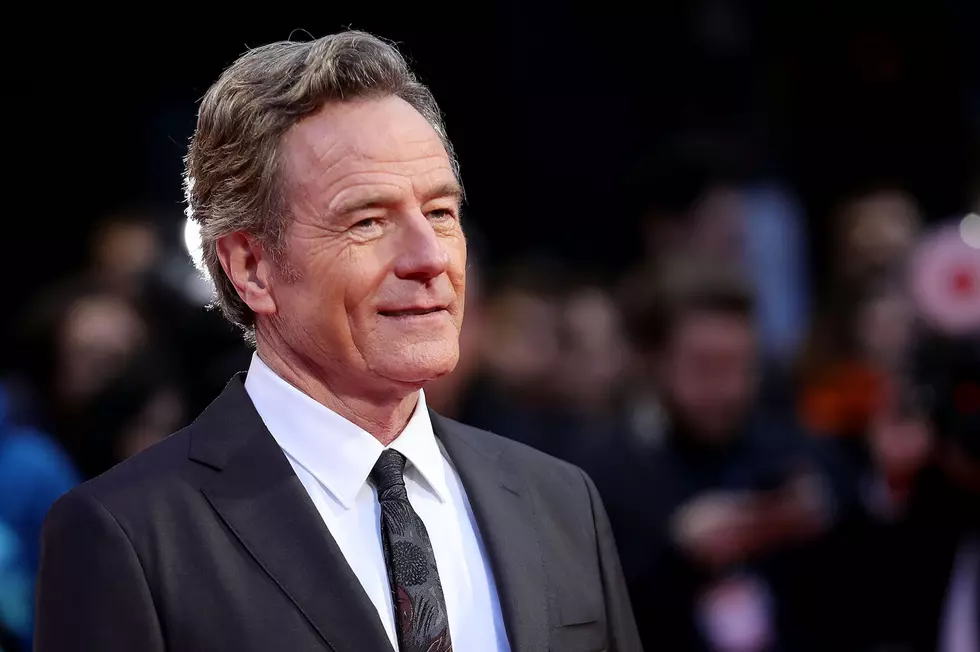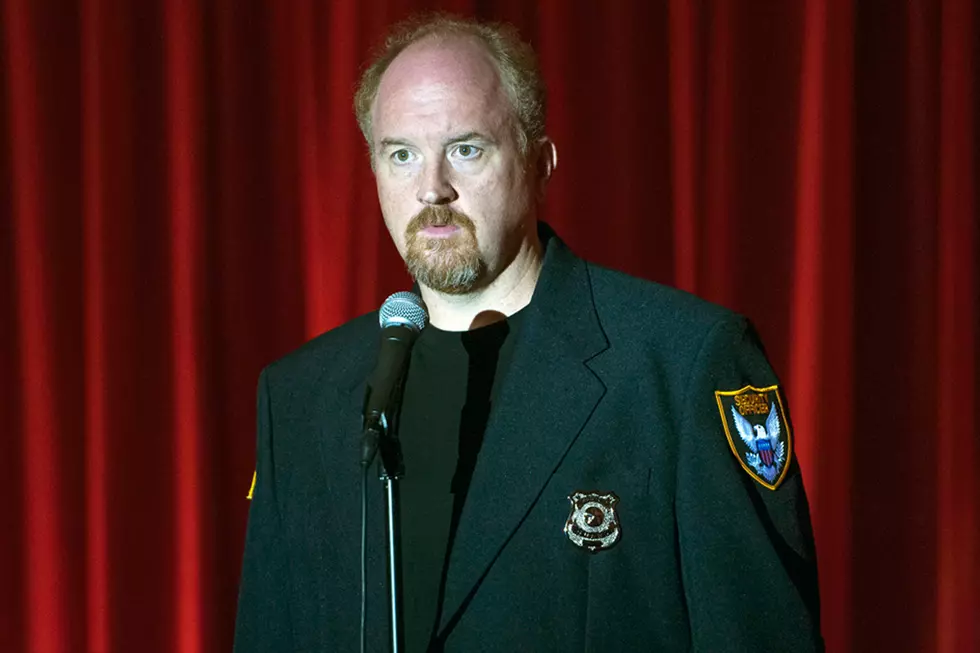
Bryan Cranston on ‘Last Flag Flying’ and What Makes Richard Linklater a Great Director
Before he was Walter White, before he was Hal on Malcolm in the Middle, before he was LBJ and Dalton Trumbo, Bryan Cranston was Tim Whatley, Seinfeld’s “dentist to the stars” who appeared in several of the show’s best episodes, including “The Yada Yada,” where Whatley converted to Judaism and drew the ire of Jerry, who is then accused of being a virulent “anti-dentite.”
Walking into a hotel room to speak to Cranston about his new movie Last Flag Flying, another Seinfeldism came to mind: “the kavorka.” That was the Latvian word for “the lure of the animal,” an irresistible charm that Kramer supposedly possessed. Cranston didn’t appear in the episode that introduced the kavorka, but he has more of it than almost any actor I’ve interviewed. He just exudes this endearing energy, that undefinable “it” factor. Cranston may have made his name on television, but he oozes a movie star’s charisma.
That sort of magnetic appeal is a big reason why he is perfect for his role in Last Flag Flying, director Richard Linklater’s film about a trio of Vietnam War vets who reunite for an important task. The characters have their roots in the 1970s classic The Last Detail, starring Jack Nicholson, Randy Quaid, and Otis Young and based on a novel of the same name by Darryl Ponicsan. Decades later, Ponicsan wrote a sequel that imagined what happened to this trio of men. Linklater’s version fudges the details so that Last Flag Flying isn’t a direct and exact continuation of the story, but Cranston is ostensibly playing the Nicholson role. His Sal Nealon is a gregarious bartender who agrees to accompany his old war buddies Doc (Steve Carell) and Mueller (Laurence Fishburne) on a journey to retrieve Doc’s son’s body after he is killed in Iraq.
The film’s road-trip structure mirrors The Last Detail’s, and also resembles many of Linklater’s previous movies about the lives and relationships of a close-knit group of men. I asked Cranston what makes Linklater so good at making such talky movies, what it was like taking over a role that was (sort of) previously played by Nicholson, and assorted other yada yada yada.
In another interview you gave, you said that if a role scares you, you like that. So what about this role scared you?
Sal is a big personality. He can chew the scenery. And you know I had a talk with Rick [Linklater] about it early on and I said, “Well, I’m just going to put my foot to the accelerator, and you let me know when you want me to back off.” But I have to kind of do that to know the extent of where the character should go. I have to kind of go too far, and then feel like “Oh, it felt like it was too far.” And if I can’t feel it, I trust that my director will feel it or that my fellow actors might help me with that. It’s not a contained, measured character. He’s a loose cannon. And those are scary roles to take on. You have to drive scenes. You are instigator of scenes, you are the wrench in a scene; you f—k things up in a scene. It’s like “Oh my god couldn't you just keep your mouth shut?” You know that kind of guy. Sal is that kind of guy.
So did you rely on Richard Linklater to tell you when to take the the foot off the gas a lot or was it pretty easy to get in the right range on your own?
He’s so good at what he does. He so softly orchestrates you that you don’t even notice. He might suggest looking in another direction, and just looking in the other direction might automatically require you to lift your foot off the accelerator and go into another direction. He’s so good at it. He’s not an effusive kind of guy. He’s not sycophantic. He doesn’t blow smoke up anyone’s ass. So by virtue of that, you trust him. You trust when he says “Yeah, we’ve got it. I’m very happy with what we have.”
He is so good at making movies about people talking, which can be so deadly in the wrong hands. But in his hands it always works. I mean that’s why we go to his movies: To watch people talk. What does he have that’s rare, that enables him to make these kinds of movies that other directors, even good directors, don’t have?
He has a very honest sensibility to how human beings relate to each other. So he could be in the head of Sal, my character, or he can be in Mueller’s head, or Doc’s head, and he can go between them and say “That’s a Doc line. Oh [Laurence Fishburne] would say this now, Steve would say that, Brian might say this now,” and just kind of mix it up.
We had a three week rehearsal period where we sat around and read. We read scenes, we blocked it a little bit to see how it felt, and during that process, he then sees “Oh, I was wrong about that line. I think it’s too much, cross it out” or “We need even more to build the scene up, to let it play out even further.” Then we might do an improv. We did several improvs during the film; staying true to what was written in the text, and then you go off.
He’s ultimately very trusting of the actors he hires. In my case, Sal is ... he’s a bull. He’s clumsy and he makes mistakes and he pisses people off. And he steps on toes and he is insulting and yet at the bottom of it he’s also a dear friend who will do anything for you.
You mentioned there was a little improvising on this film. I loved listening to these characters talk; and the dialogue is so good that it’s hard to believe that it could be improvised, but at the same time, you guys had this very natural conversational rhythm. Based on what you just said, it sounds like rehearsal was the secret sauce there.
Yeah. In other words, you can write a scene. You say something, I say something, you say something, we say something. But when you’re actually in it, a character may feel compelled to jump in quicker. That’s very real and an exchange that is very honest. “Why don’t you stop talking for second? Do you ever shut up?” Whatever comes to you as long as you know what your character is and you feel comfortable in improvisation and all three of us are. And if we get off topic, Rick brings us back on topic and we’ll do another take.
The movie sort of is and isn’t a sequel. You’re sort of playing a character that was played by Jack Nicholson, and at the same time you’re not playing that same character. Did you think about that at all? Did you go back and rewatch The Last Detail?
No. I did not want to watch it. Nicholson is an icon. His performances are indelible. For an actor playing a role that was written for him to play, it would have been a big mistake for me to try to see his cockiness or Nicholson-isms. No, I don’t want to do that. I don’t want to do an impersonation of Jack. Jack is Jack. I want to make Sal someone who is independent of that.
At the same time, it’s like Sal could be the grandson or the son of a Jack Nicholson character. So he’s not necessarily…he could be his offspring and could have some sensibilities that were the same, and that’s true. My character was built around the sensibilities of Jack’s character and Doc was built around the same sensibilities as Randy Quaid’s character. But no, you kind of want to investigate and explore on your own to create your own character.
I was curious if there were any memories of the Vietnam era of yours or maybe personal relationships you had with someone who may have served in Vietnam that you drew on to build this character.
I grew up and was a kid during the Vietnam era. Every night Walter Cronkite or Eric Sevareid or David Brinkley would give the body count; how many people died that day, and every day you would hear: “13 Army personnel died today. A Navy ship was sunk.” It was part of our evening ritual, unfortunate as it was. It wasn’t a great thing because you became rather numb to it and they were just numbers. A number goes by quickly and you don’t necessarily associate, “Wait! Let me get one of those numbers and now open that up, oh here’s the name, face and family.” It’s dehumanizing to just leave it in the form of numbers.
I think a film like Last Flag Flying, we humanize the experience. To the Pentagon, we’re just three knuckleheads in the Marines during the Vietnam War, but to us, we’re alive. We have history and in some people’s case they have a future. In Mueller’s case, he wants to put it behind him and move on and grow and become a fully realized person and he does, taking on the clergy and becoming a leader. My character is self-medicating. He’s past his prime and he knows it. His prime was in those days, those were his halcyon days there. Doc is in just great despair, so there’s three different energies mixing together.
It’s funny that you mentioned Walter Cronkite and those newscasters, because you’re going to be playing Howard Beale in a stage adaptation of Network. I wanted to ask you about that because that is another sort of seminal classic of the ’70s and here we have sort of a sequel, to at least one of my favorite ’70s movies, The Last Detail. Is there something about that period that has a particular interest to you?
Probably. I remember the assassination of JFK and the first president I really ever paid any attention to was LBJ, I went on to play LBJ [in the play and television movie All the Way]. I think it triggers something but if the story isn’t well-written, well-researched, and grounded in a sense of reality, then I wouldn’t be interested in doing it. All the Way was that, Network certainly is that. So yeah, I’m playing in this brilliant piece of literature this winter in England and I can’t wait.
It’s never been done on a stage before, right?
No, this is brand new. It’s been adapted by Lee Hall, a well-known playwright. Ivo Van Hove is directing and I’m excited to get back to rehearsing.
It’s uncanny watching it now. You rewatch the movie and it predicted so much.
Well there again, also, I don’t look at what Peter Finch [who played Beale in Network] did. No, I needed and I have to make it my own. If an actor does not declare ownership of a character, then you’re out to sea. It’s floating around and you don’t feel comfortable, so you have to pull it in and welcome the sensibility of that character, and then do it night after night.
As a huge Seinfeld fan, I have to close with this question: How often, in your day-to-day life do you ever hear the phrase, “anti-dentite”?
I hear it about every month or so. It always brings a smile to my face. Working on that show, and I mention in my book, it was like going to comedy boot camp. I’ve since talked with Jerry and Jason Alexander, who’s a friend, Julia [Louis-Dreyfus) is a friend. I’m on the new season of Curb Your Enthusiasm.
I saw you in the trailer for the new season. I thought you had a slightly Tim Whatley-esque look to you.
What’s funny about Whatley is that, as a guest star, I had my hair in different stages because I would do different things. My whole thing is whenever I stop doing a role, I would just grow facial hair and my head hair. For instance, my muttonchops are long now for Network. But up until this morning, I had a beard. So I just grow and then shave.
Sometimes as Whatley, I had short hair, sometimes I had a beard. Sometimes I didn’t have a beard, so it changed a lot. [For Curb] I did have a beard and I don’t know why. I must have been in between things and asked, “Do you like the beard?” No, I like the beard. It kind of looks like a therapist would have a beard. It was so much fun, I’m telling you that show, with Richard Lewis and Jeff Garlin — I mean, it’s just a blast. Larry is Larry so you get to see the quirky oddness that Larry David brought to Seinfeld by watching Curb. And you see what a genius Jerry is by watching Seinfeld.
More From WDBQ-FM










